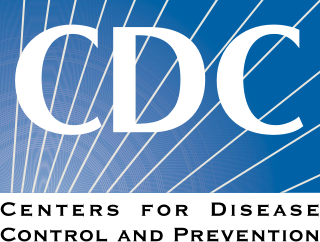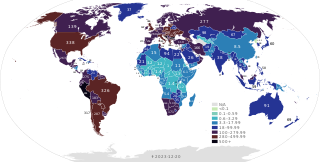Related Research Articles

The Centers for Disease Control and Prevention (CDC) is a national public health institute in the United States. It is a United States federal agency, under the Department of Health and Human Services, and is headquartered in Atlanta, Georgia.

A disease is a particular abnormal condition that negatively affects the structure or function of all or part of an organism, and that is not due to any immediate external injury. Diseases are often known to be medical conditions that are associated with specific symptoms and signs. A disease may be caused by external factors such as pathogens or by internal dysfunctions. For example, internal dysfunctions of the immune system can produce a variety of different diseases, including various forms of immunodeficiency, hypersensitivity, allergies and autoimmune disorders.

A mental disorder, also called a mental illness or psychiatric disorder, is a behavioral or mental pattern that causes significant distress or impairment of personal functioning. Such features may be persistent, relapsing and remitting, or occur as a single episode. Many disorders have been described, with signs and symptoms that vary widely between specific disorders. Such disorders may be diagnosed by a mental health professional.

Tuberculosis (TB) is an infectious disease usually caused by Mycobacterium tuberculosis (MTB) bacteria. Tuberculosis generally affects the lungs, but can also affect other parts of the body. Most infections show no symptoms, in which case it is known as latent tuberculosis. About 10% of latent infections progress to active disease which, if left untreated, kills about half of those affected. The classic symptoms of active TB are a chronic cough with blood-containing mucus, fever, night sweats, and weight loss. It was historically called consumption due to the weight loss. Infection of other organs can cause a wide range of symptoms.

The World Health Organization (WHO) is a specialized agency of the United Nations responsible for international public health. The WHO Constitution, which establishes the agency's governing structure and principles, states its main objective as "the attainment by all peoples of the highest possible level of health." It is headquartered in Geneva, Switzerland, with six semi-autonomous regional offices and 150 field offices worldwide.

The United States Department of Health & Human Services (HHS), also known as the Health Department, is a cabinet-level executive branch department of the U.S. federal government with the goal of protecting the health of all Americans and providing essential human services. Its motto is "Improving the health, safety, and well-being of America". Before the separate federal Department of Education was created in 1979, it was called the Department of Health, Education, and Welfare (HEW).
A health system, also sometimes referred to as health care system or as healthcare system, is the organization of people, institutions, and resources that deliver health care services to meet the health needs of target populations.
Epidemiology is the study and analysis of the distribution, patterns and determinants of health and disease conditions in defined populations.
Health is a state of physical, mental and social well-being in which disease and infirmity are absent.

The surgeon general of the United States is the operational head of the U.S. Public Health Service Commissioned Corps (PHSCC) and thus the leading spokesperson on matters of public health in the federal government of the United States. The Surgeon General's office and staff are known as the Office of the Surgeon General (OSG) which is housed within the Office of the Assistant Secretary for Health.

Health care, health-care, or healthcare is the maintenance or improvement of health via the prevention, diagnosis, treatment, recovery, or cure of disease, illness, injury, and other physical and mental impairments in people. Health care is delivered by health professionals and allied health fields. Physicians and physician associates are a part of these health professionals. Dentistry, pharmacy, midwifery, nursing, medicine, optometry, audiology, psychology, occupational therapy, physical therapy, athletic training and other health professions are all part of health care. It includes work done in providing primary care, secondary care, and tertiary care, as well as in public health.

Public health has been defined as "the science and art of preventing disease”, prolonging life and improving quality of life through organized efforts and informed choices of society, organizations, communities and individuals. Analyzing the determinants of health of a population and the threats it faces is the basis for public health. The public can be as small as a handful of people or as large as a village or an entire city; in the case of a pandemic it may encompass several continents. The concept of health takes into account physical, psychological, and social well-being. As such, according to the World Health Organization, it is not merely the absence of disease or infirmity and more recently, a resource for everyday living.
Mental health, defined by the World Health Organization (WHO), is “a state of well-being in which the individual realizes his or her own abilities, can cope with the normal stresses of life, can work productively and fruitfully, and is able to make a contribution to his or her community”. The three core components of this definition are (1) well-being, (2) effective functioning of an individual, and (3) effective functioning for a community. According to the WHO, mental health includes "subjective well-being, perceived self-efficacy, autonomy, competence, intergenerational dependence, and self-actualization of one's intellectual and emotional potential, among others". From the perspectives of positive psychology or of holism, mental health may include an individual's ability to enjoy life and to create a balance between life activities and efforts to achieve psychological resilience. Cultural differences, subjective assessments, and competing professional theories all affect how one defines "mental health".

Nursing is a profession within the health care sector focused on the care of individuals, families, and communities so they may attain, maintain, or recover optimal health and quality of life. Nurses may be differentiated from other health care providers by their approach to patient care, training, and scope of practice. Nurses practice in many specialties with differing levels of prescription authority. Many nurses provide care within the ordering scope of physicians, and this traditional role has shaped the public image of nurses as care providers. However, nurse practitioners are permitted by most jurisdictions to practice independently in a variety of settings. Since the postwar period, nurse education has undergone a process of diversification towards advanced and specialized credentials, and many of the traditional regulations and provider roles are changing.

The Affordable Care Act (ACA), formally known as the Patient Protection and Affordable Care Act, and commonly known as Obamacare, is a United States federal statute enacted by the 111th United States Congress and signed into law by President Barack Obama on March 23, 2010. Together with the Health Care and Education Reconciliation Act of 2010 amendment, it represents the U.S. healthcare system's most significant regulatory overhaul and expansion of coverage since the passage of Medicare and Medicaid in 1965.

Occupational safety and health (OSH), also commonly referred to as occupational health and safety (OHS), occupational health, or occupational safety, is a multidisciplinary field concerned with the safety, health, and welfare of people at occupation. These terms also refer to the goals of this field, so their use in the sense of this article was originally an abbreviation of occupational safety and health program/department etc.

The COVID-19 pandemic, also known as the coronavirus pandemic, is an ongoing pandemic of coronavirus disease 2019 (COVID-19) caused by severe acute respiratory syndrome coronavirus 2 (SARS-CoV-2). It was first identified in December 2019 in Wuhan, China. The World Health Organization declared the outbreak a Public Health Emergency of International Concern in January 2020 and a pandemic in March 2020. As of 25 December 2020, more than 79.2 million cases have been confirmed, with more than 1.74 million deaths attributed to COVID-19.

This article provides a general overview and documents the status of locations affected by the severe acute respiratory syndrome coronavirus 2 (SARS-CoV-2), the virus which causes coronavirus disease 2019 (COVID-19) and is responsible for the COVID-19 pandemic. The first human cases of COVID-19 were identified in Wuhan the capital of the province of Hubei in China in December 2019. The most recent country or territory to report its first confirmed case was Antarctica on 21 December 2020.

Coronavirus disease 2019 (COVID-19) is a contagious disease caused by severe acute respiratory syndrome coronavirus 2 (SARS-CoV-2). The first case was identified in Wuhan, China, in December 2019. It has since spread worldwide, leading to an ongoing pandemic.

The COVID-19 pandemic in the United States is part of the worldwide pandemic of coronavirus disease 2019. More than 18,600,000 confirmed cases have been reported since January 2020, resulting in more than 328,000 deaths, the most of any country and the thirteenth-highest on a per capita basis. COVID-19 became the third leading cause of death in the US in 2020, behind only heart disease and cancer.
References
- ↑ Leary, Neil (2007). Climate Change and Vulnerability and Adaptation. Earthscan. p. 157. ISBN 9781136569395.
- ↑ "MONTHLY HEALTH STATISTICS BULLETIN Vol 9/16" (PDF). MINISTRY OF HEALTH. Retrieved 3 February 2019.
| This Seychelles location article is a stub. You can help Wikipedia by expanding it. |